Psychology Lab Report: Facebook, Happiness, and Loneliness Study
VerifiedAdded on 2022/11/29
|11
|2253
|421
Report
AI Summary
This psychology lab report investigates the relationship between Facebook use, happiness, and loneliness among young adults. The study, conducted using a quantitative survey methodology, involved 486 participants and explored the correlation between these variables. The report presents two hypotheses: one suggesting an impact of happiness and loneliness on Facebook use, and another proposing a negative association between happiness and Facebook use, and a positive association between loneliness and Facebook use. The findings indicate a negative correlation between happiness and Facebook use, and a positive correlation between loneliness and Facebook use. The discussion section analyzes the implications of these findings, suggesting that increased socialization may positively impact happiness and reduce reliance on social media. The study also acknowledges limitations, such as the survey-based data collection method and varying significance levels, and suggests future research directions, including the use of qualitative research methods and a larger sample size. The report concludes by emphasizing the importance of understanding the psychological effects of social media use and promoting strategies to enhance real-world social interactions.
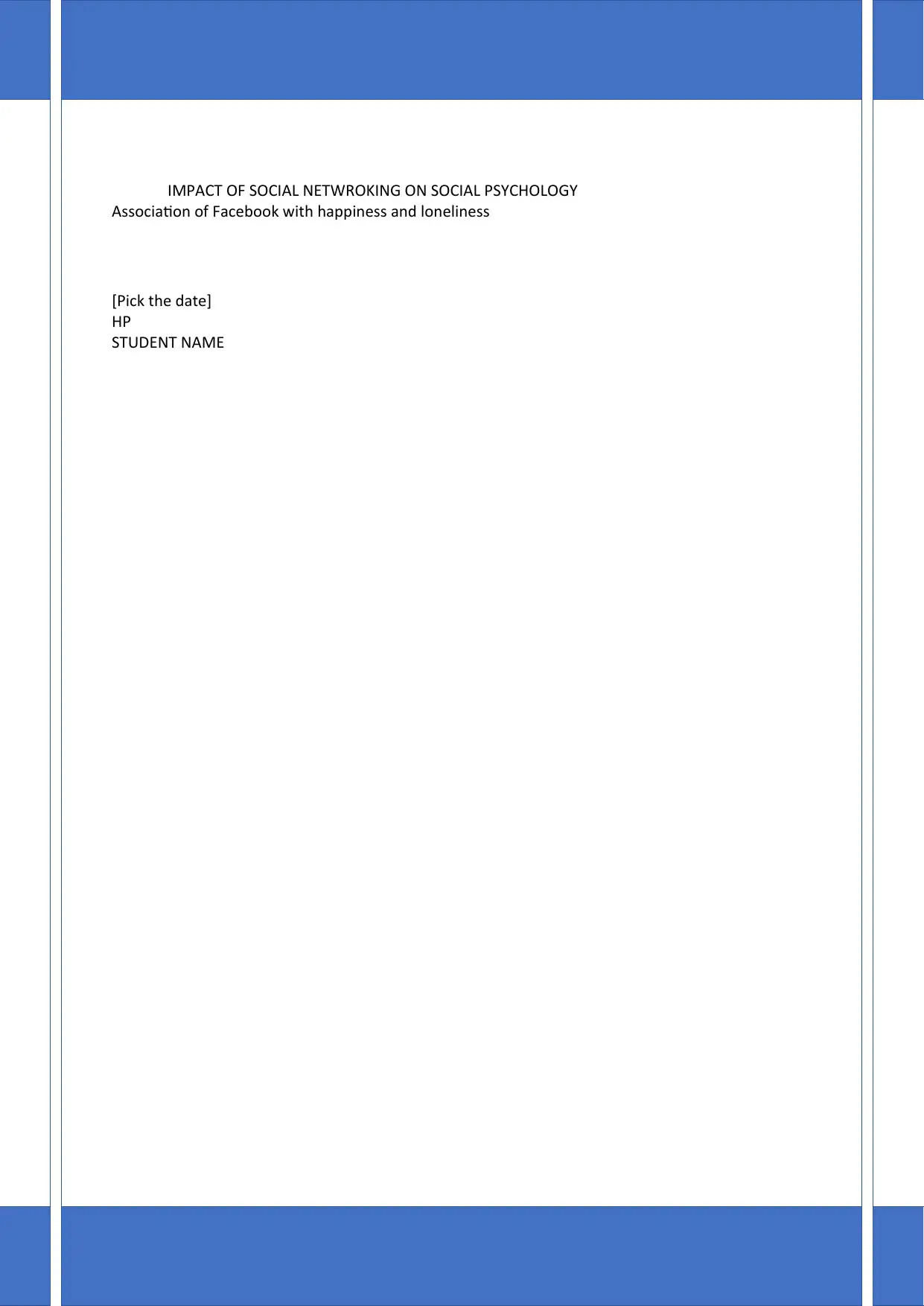
IMPACT OF SOCIAL NETWROKING ON SOCIAL PSYCHOLOGY
Association of Facebook with happiness and loneliness
[Pick the date]
HP
STUDENT NAME
Association of Facebook with happiness and loneliness
[Pick the date]
HP
STUDENT NAME
Paraphrase This Document
Need a fresh take? Get an instant paraphrase of this document with our AI Paraphraser
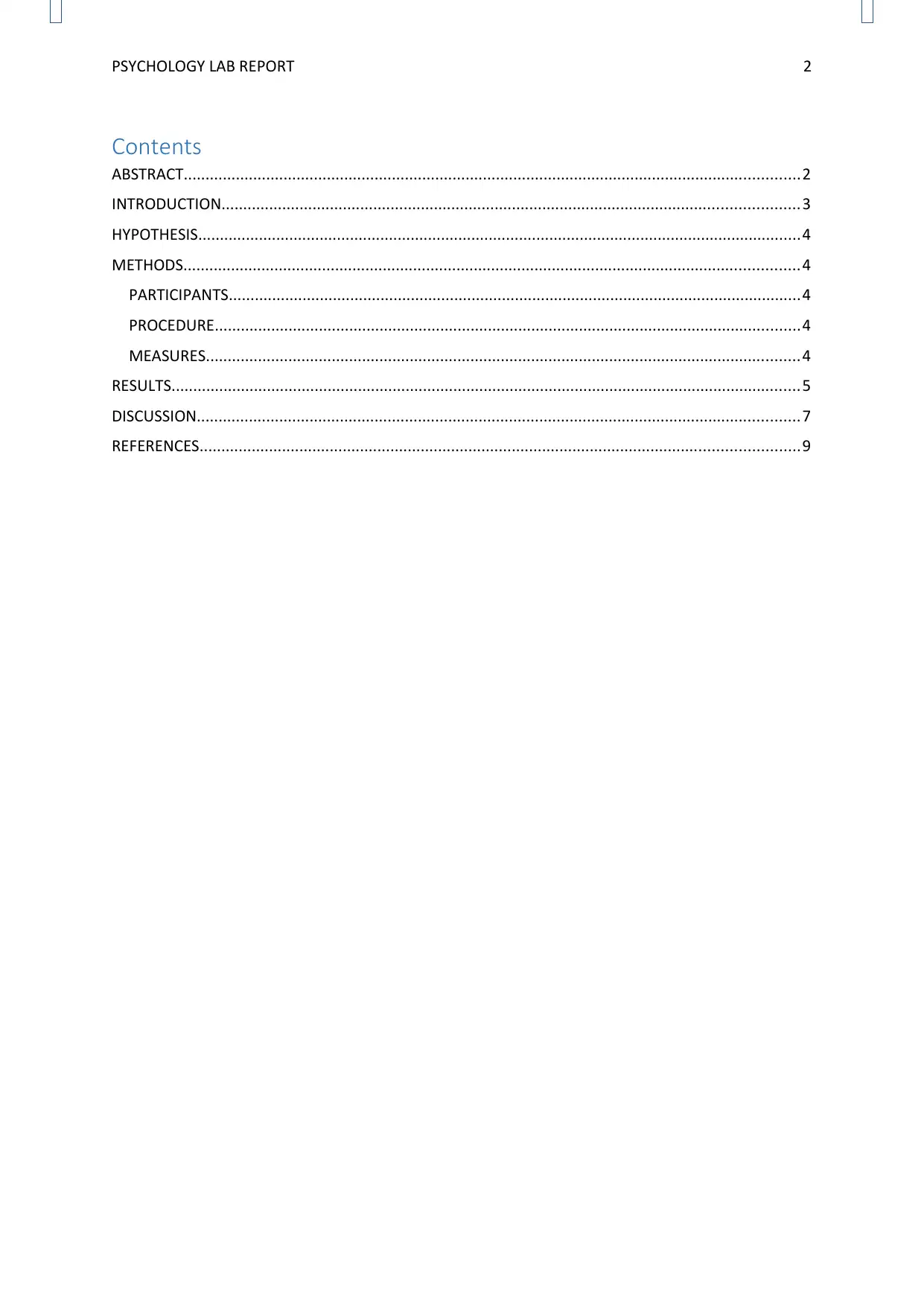
PSYCHOLOGY LAB REPORT 2
Contents
ABSTRACT..............................................................................................................................................2
INTRODUCTION.....................................................................................................................................3
HYPOTHESIS...........................................................................................................................................4
METHODS..............................................................................................................................................4
PARTICIPANTS....................................................................................................................................4
PROCEDURE.......................................................................................................................................4
MEASURES.........................................................................................................................................4
RESULTS.................................................................................................................................................5
DISCUSSION...........................................................................................................................................7
REFERENCES..........................................................................................................................................9
Contents
ABSTRACT..............................................................................................................................................2
INTRODUCTION.....................................................................................................................................3
HYPOTHESIS...........................................................................................................................................4
METHODS..............................................................................................................................................4
PARTICIPANTS....................................................................................................................................4
PROCEDURE.......................................................................................................................................4
MEASURES.........................................................................................................................................4
RESULTS.................................................................................................................................................5
DISCUSSION...........................................................................................................................................7
REFERENCES..........................................................................................................................................9
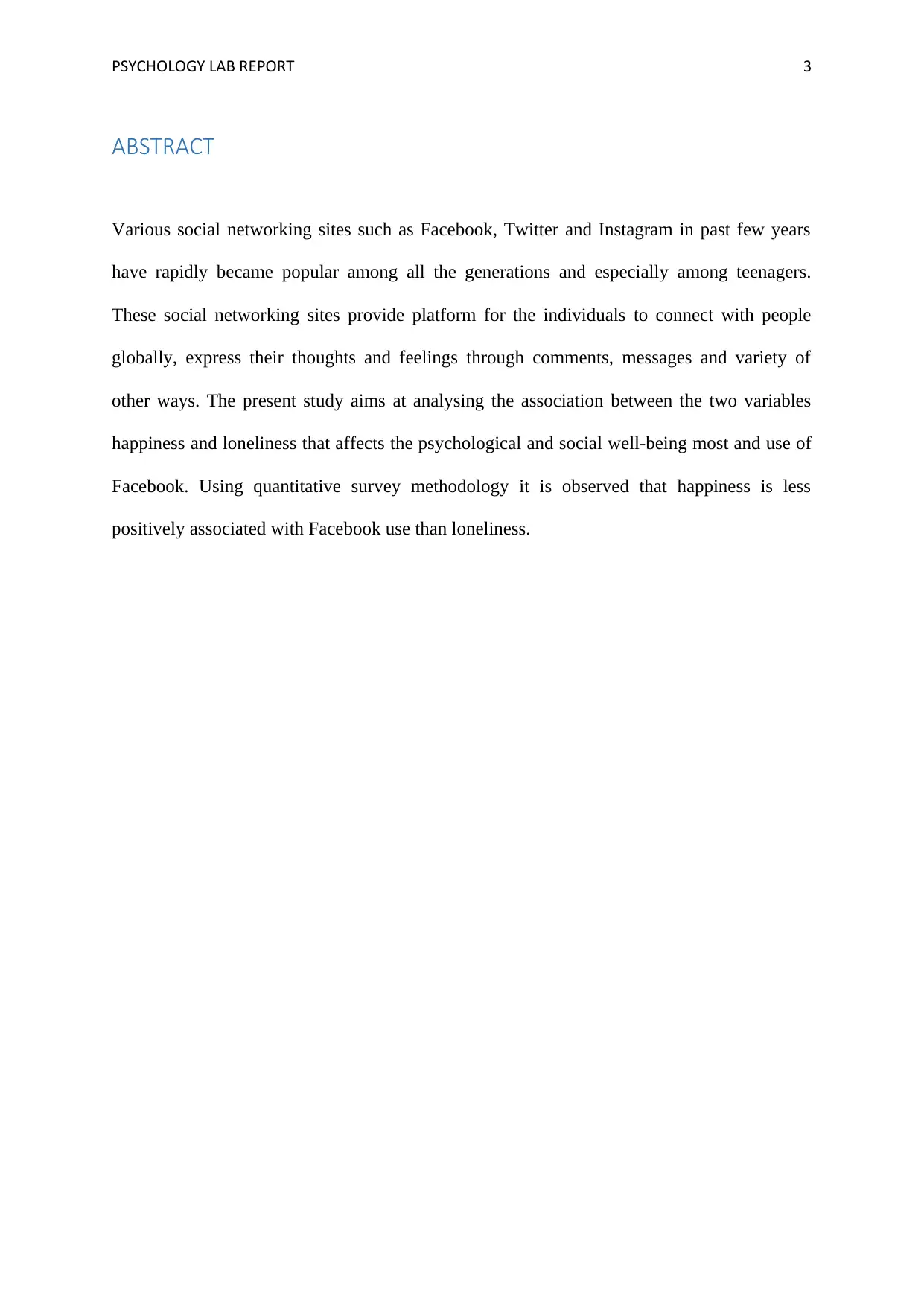
PSYCHOLOGY LAB REPORT 3
ABSTRACT
Various social networking sites such as Facebook, Twitter and Instagram in past few years
have rapidly became popular among all the generations and especially among teenagers.
These social networking sites provide platform for the individuals to connect with people
globally, express their thoughts and feelings through comments, messages and variety of
other ways. The present study aims at analysing the association between the two variables
happiness and loneliness that affects the psychological and social well-being most and use of
Facebook. Using quantitative survey methodology it is observed that happiness is less
positively associated with Facebook use than loneliness.
ABSTRACT
Various social networking sites such as Facebook, Twitter and Instagram in past few years
have rapidly became popular among all the generations and especially among teenagers.
These social networking sites provide platform for the individuals to connect with people
globally, express their thoughts and feelings through comments, messages and variety of
other ways. The present study aims at analysing the association between the two variables
happiness and loneliness that affects the psychological and social well-being most and use of
Facebook. Using quantitative survey methodology it is observed that happiness is less
positively associated with Facebook use than loneliness.
⊘ This is a preview!⊘
Do you want full access?
Subscribe today to unlock all pages.

Trusted by 1+ million students worldwide
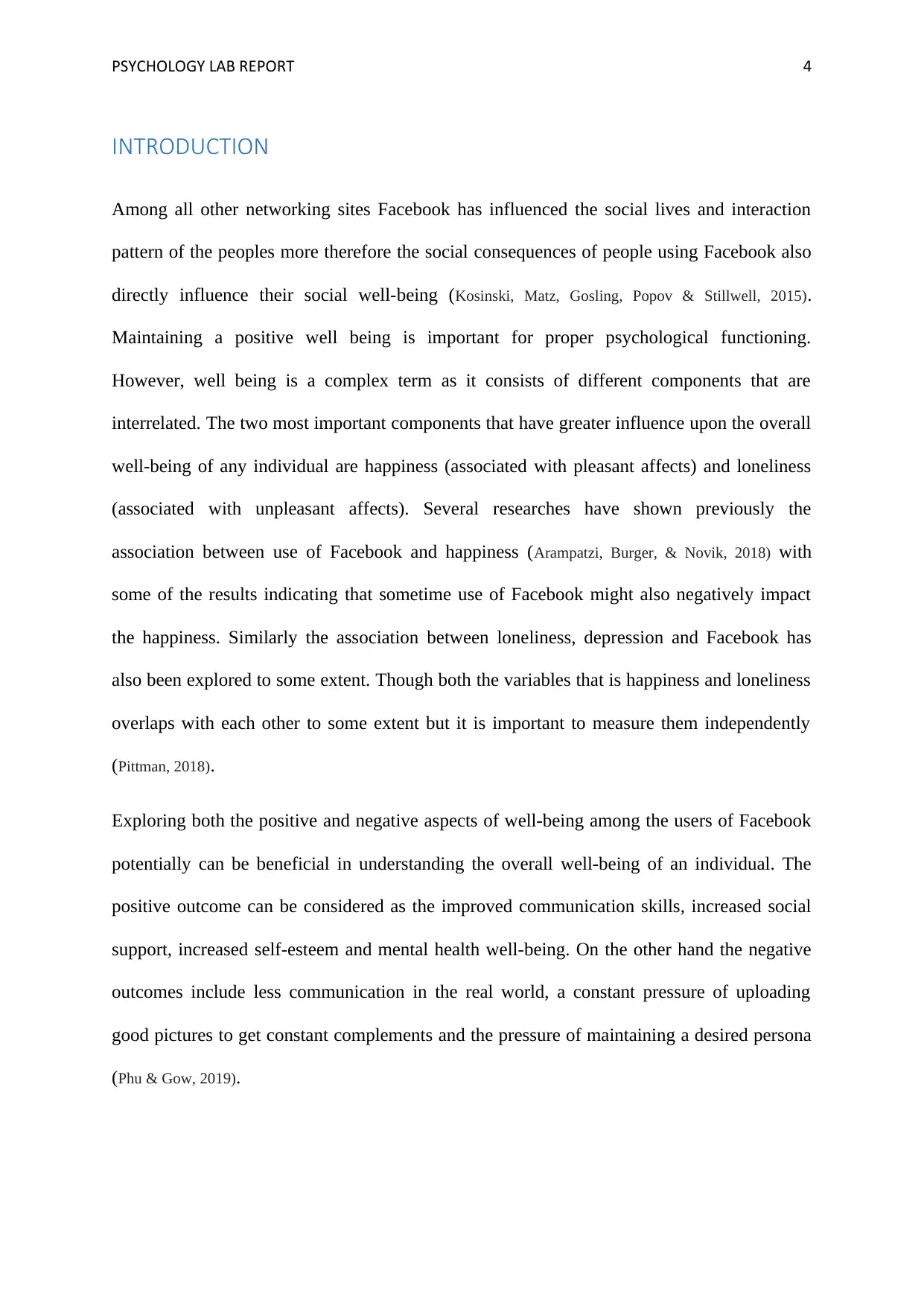
PSYCHOLOGY LAB REPORT 4
INTRODUCTION
Among all other networking sites Facebook has influenced the social lives and interaction
pattern of the peoples more therefore the social consequences of people using Facebook also
directly influence their social well-being (Kosinski, Matz, Gosling, Popov & Stillwell, 2015).
Maintaining a positive well being is important for proper psychological functioning.
However, well being is a complex term as it consists of different components that are
interrelated. The two most important components that have greater influence upon the overall
well-being of any individual are happiness (associated with pleasant affects) and loneliness
(associated with unpleasant affects). Several researches have shown previously the
association between use of Facebook and happiness (Arampatzi, Burger, & Novik, 2018) with
some of the results indicating that sometime use of Facebook might also negatively impact
the happiness. Similarly the association between loneliness, depression and Facebook has
also been explored to some extent. Though both the variables that is happiness and loneliness
overlaps with each other to some extent but it is important to measure them independently
(Pittman, 2018).
Exploring both the positive and negative aspects of well-being among the users of Facebook
potentially can be beneficial in understanding the overall well-being of an individual. The
positive outcome can be considered as the improved communication skills, increased social
support, increased self-esteem and mental health well-being. On the other hand the negative
outcomes include less communication in the real world, a constant pressure of uploading
good pictures to get constant complements and the pressure of maintaining a desired persona
(Phu & Gow, 2019).
INTRODUCTION
Among all other networking sites Facebook has influenced the social lives and interaction
pattern of the peoples more therefore the social consequences of people using Facebook also
directly influence their social well-being (Kosinski, Matz, Gosling, Popov & Stillwell, 2015).
Maintaining a positive well being is important for proper psychological functioning.
However, well being is a complex term as it consists of different components that are
interrelated. The two most important components that have greater influence upon the overall
well-being of any individual are happiness (associated with pleasant affects) and loneliness
(associated with unpleasant affects). Several researches have shown previously the
association between use of Facebook and happiness (Arampatzi, Burger, & Novik, 2018) with
some of the results indicating that sometime use of Facebook might also negatively impact
the happiness. Similarly the association between loneliness, depression and Facebook has
also been explored to some extent. Though both the variables that is happiness and loneliness
overlaps with each other to some extent but it is important to measure them independently
(Pittman, 2018).
Exploring both the positive and negative aspects of well-being among the users of Facebook
potentially can be beneficial in understanding the overall well-being of an individual. The
positive outcome can be considered as the improved communication skills, increased social
support, increased self-esteem and mental health well-being. On the other hand the negative
outcomes include less communication in the real world, a constant pressure of uploading
good pictures to get constant complements and the pressure of maintaining a desired persona
(Phu & Gow, 2019).
Paraphrase This Document
Need a fresh take? Get an instant paraphrase of this document with our AI Paraphraser
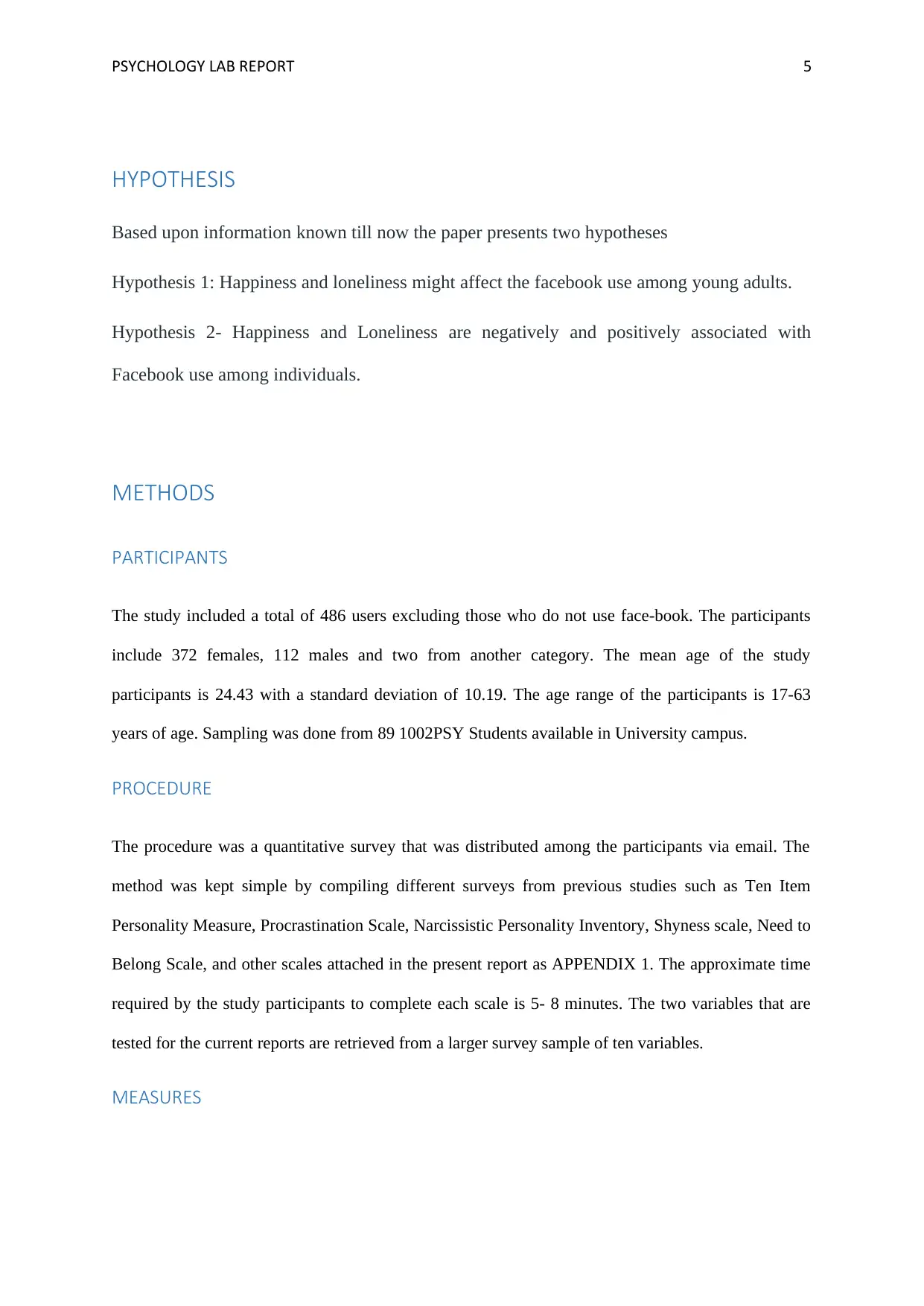
PSYCHOLOGY LAB REPORT 5
HYPOTHESIS
Based upon information known till now the paper presents two hypotheses
Hypothesis 1: Happiness and loneliness might affect the facebook use among young adults.
Hypothesis 2- Happiness and Loneliness are negatively and positively associated with
Facebook use among individuals.
METHODS
PARTICIPANTS
The study included a total of 486 users excluding those who do not use face-book. The participants
include 372 females, 112 males and two from another category. The mean age of the study
participants is 24.43 with a standard deviation of 10.19. The age range of the participants is 17-63
years of age. Sampling was done from 89 1002PSY Students available in University campus.
PROCEDURE
The procedure was a quantitative survey that was distributed among the participants via email. The
method was kept simple by compiling different surveys from previous studies such as Ten Item
Personality Measure, Procrastination Scale, Narcissistic Personality Inventory, Shyness scale, Need to
Belong Scale, and other scales attached in the present report as APPENDIX 1. The approximate time
required by the study participants to complete each scale is 5- 8 minutes. The two variables that are
tested for the current reports are retrieved from a larger survey sample of ten variables.
MEASURES
HYPOTHESIS
Based upon information known till now the paper presents two hypotheses
Hypothesis 1: Happiness and loneliness might affect the facebook use among young adults.
Hypothesis 2- Happiness and Loneliness are negatively and positively associated with
Facebook use among individuals.
METHODS
PARTICIPANTS
The study included a total of 486 users excluding those who do not use face-book. The participants
include 372 females, 112 males and two from another category. The mean age of the study
participants is 24.43 with a standard deviation of 10.19. The age range of the participants is 17-63
years of age. Sampling was done from 89 1002PSY Students available in University campus.
PROCEDURE
The procedure was a quantitative survey that was distributed among the participants via email. The
method was kept simple by compiling different surveys from previous studies such as Ten Item
Personality Measure, Procrastination Scale, Narcissistic Personality Inventory, Shyness scale, Need to
Belong Scale, and other scales attached in the present report as APPENDIX 1. The approximate time
required by the study participants to complete each scale is 5- 8 minutes. The two variables that are
tested for the current reports are retrieved from a larger survey sample of ten variables.
MEASURES
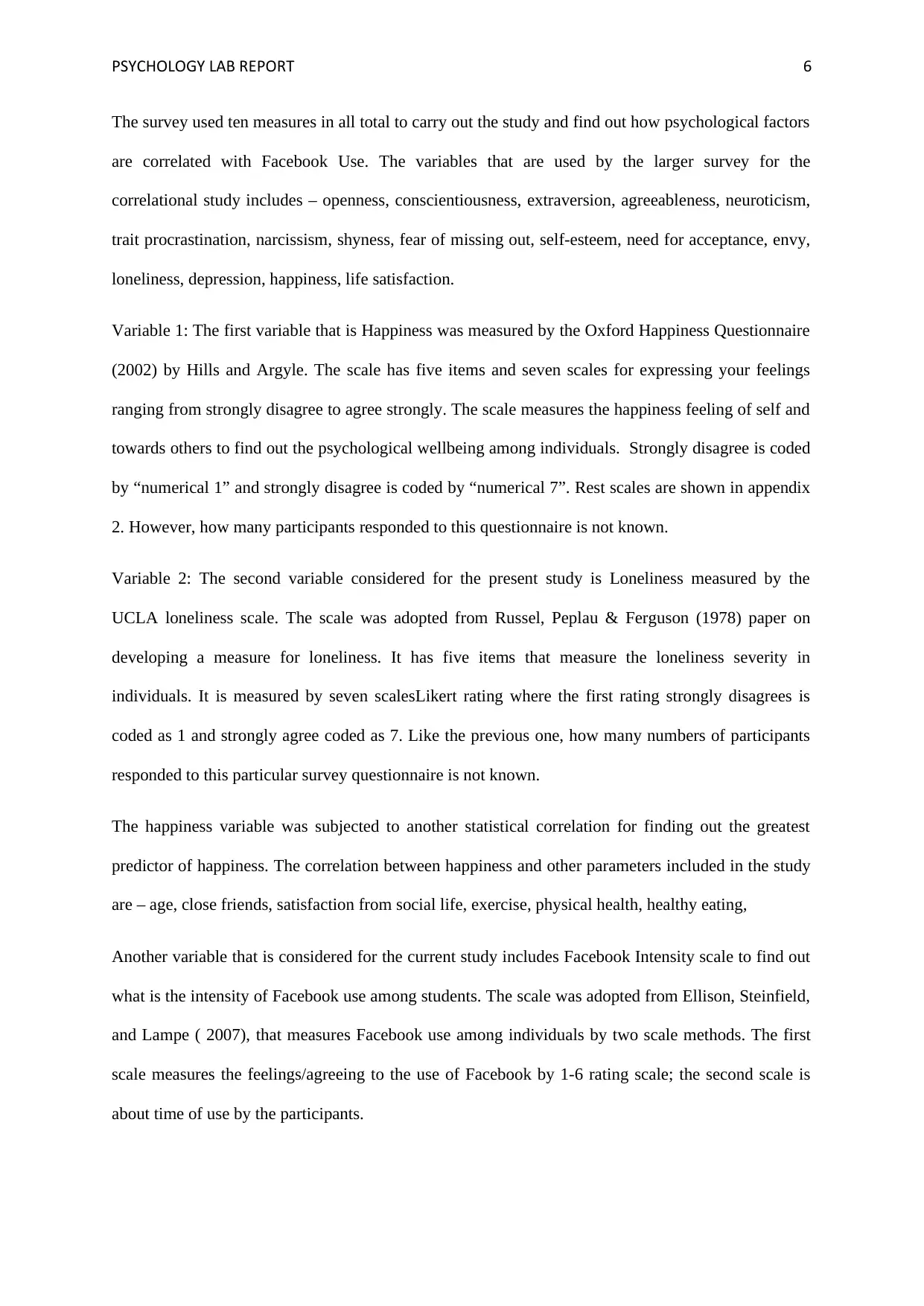
PSYCHOLOGY LAB REPORT 6
The survey used ten measures in all total to carry out the study and find out how psychological factors
are correlated with Facebook Use. The variables that are used by the larger survey for the
correlational study includes – openness, conscientiousness, extraversion, agreeableness, neuroticism,
trait procrastination, narcissism, shyness, fear of missing out, self-esteem, need for acceptance, envy,
loneliness, depression, happiness, life satisfaction.
Variable 1: The first variable that is Happiness was measured by the Oxford Happiness Questionnaire
(2002) by Hills and Argyle. The scale has five items and seven scales for expressing your feelings
ranging from strongly disagree to agree strongly. The scale measures the happiness feeling of self and
towards others to find out the psychological wellbeing among individuals. Strongly disagree is coded
by “numerical 1” and strongly disagree is coded by “numerical 7”. Rest scales are shown in appendix
2. However, how many participants responded to this questionnaire is not known.
Variable 2: The second variable considered for the present study is Loneliness measured by the
UCLA loneliness scale. The scale was adopted from Russel, Peplau & Ferguson (1978) paper on
developing a measure for loneliness. It has five items that measure the loneliness severity in
individuals. It is measured by seven scalesLikert rating where the first rating strongly disagrees is
coded as 1 and strongly agree coded as 7. Like the previous one, how many numbers of participants
responded to this particular survey questionnaire is not known.
The happiness variable was subjected to another statistical correlation for finding out the greatest
predictor of happiness. The correlation between happiness and other parameters included in the study
are – age, close friends, satisfaction from social life, exercise, physical health, healthy eating,
Another variable that is considered for the current study includes Facebook Intensity scale to find out
what is the intensity of Facebook use among students. The scale was adopted from Ellison, Steinfield,
and Lampe ( 2007), that measures Facebook use among individuals by two scale methods. The first
scale measures the feelings/agreeing to the use of Facebook by 1-6 rating scale; the second scale is
about time of use by the participants.
The survey used ten measures in all total to carry out the study and find out how psychological factors
are correlated with Facebook Use. The variables that are used by the larger survey for the
correlational study includes – openness, conscientiousness, extraversion, agreeableness, neuroticism,
trait procrastination, narcissism, shyness, fear of missing out, self-esteem, need for acceptance, envy,
loneliness, depression, happiness, life satisfaction.
Variable 1: The first variable that is Happiness was measured by the Oxford Happiness Questionnaire
(2002) by Hills and Argyle. The scale has five items and seven scales for expressing your feelings
ranging from strongly disagree to agree strongly. The scale measures the happiness feeling of self and
towards others to find out the psychological wellbeing among individuals. Strongly disagree is coded
by “numerical 1” and strongly disagree is coded by “numerical 7”. Rest scales are shown in appendix
2. However, how many participants responded to this questionnaire is not known.
Variable 2: The second variable considered for the present study is Loneliness measured by the
UCLA loneliness scale. The scale was adopted from Russel, Peplau & Ferguson (1978) paper on
developing a measure for loneliness. It has five items that measure the loneliness severity in
individuals. It is measured by seven scalesLikert rating where the first rating strongly disagrees is
coded as 1 and strongly agree coded as 7. Like the previous one, how many numbers of participants
responded to this particular survey questionnaire is not known.
The happiness variable was subjected to another statistical correlation for finding out the greatest
predictor of happiness. The correlation between happiness and other parameters included in the study
are – age, close friends, satisfaction from social life, exercise, physical health, healthy eating,
Another variable that is considered for the current study includes Facebook Intensity scale to find out
what is the intensity of Facebook use among students. The scale was adopted from Ellison, Steinfield,
and Lampe ( 2007), that measures Facebook use among individuals by two scale methods. The first
scale measures the feelings/agreeing to the use of Facebook by 1-6 rating scale; the second scale is
about time of use by the participants.
⊘ This is a preview!⊘
Do you want full access?
Subscribe today to unlock all pages.

Trusted by 1+ million students worldwide
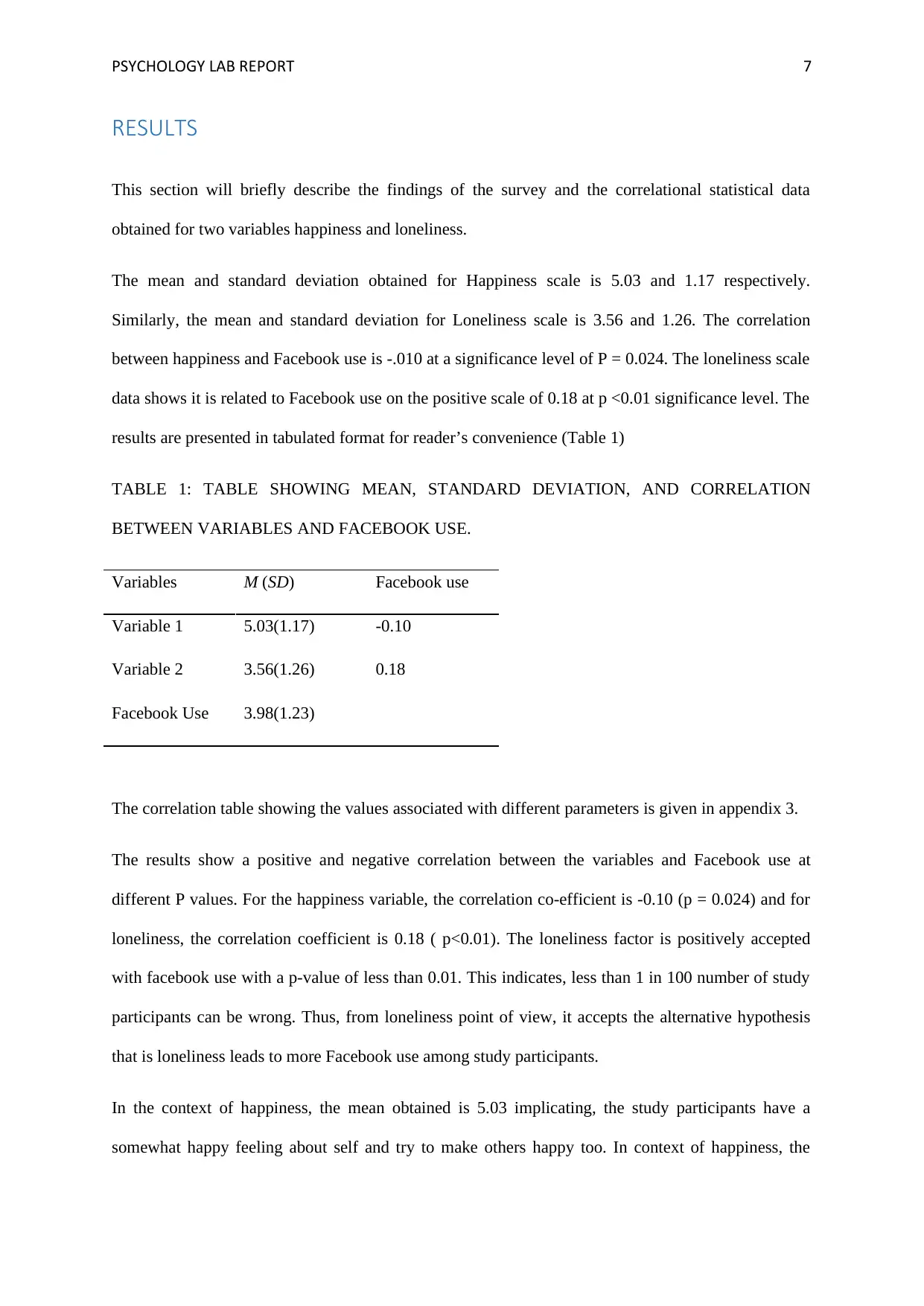
PSYCHOLOGY LAB REPORT 7
RESULTS
This section will briefly describe the findings of the survey and the correlational statistical data
obtained for two variables happiness and loneliness.
The mean and standard deviation obtained for Happiness scale is 5.03 and 1.17 respectively.
Similarly, the mean and standard deviation for Loneliness scale is 3.56 and 1.26. The correlation
between happiness and Facebook use is -.010 at a significance level of P = 0.024. The loneliness scale
data shows it is related to Facebook use on the positive scale of 0.18 at p <0.01 significance level. The
results are presented in tabulated format for reader’s convenience (Table 1)
TABLE 1: TABLE SHOWING MEAN, STANDARD DEVIATION, AND CORRELATION
BETWEEN VARIABLES AND FACEBOOK USE.
Variables M (SD) Facebook use
Variable 1 5.03(1.17) -0.10
Variable 2 3.56(1.26) 0.18
Facebook Use 3.98(1.23)
The correlation table showing the values associated with different parameters is given in appendix 3.
The results show a positive and negative correlation between the variables and Facebook use at
different P values. For the happiness variable, the correlation co-efficient is -0.10 (p = 0.024) and for
loneliness, the correlation coefficient is 0.18 ( p<0.01). The loneliness factor is positively accepted
with facebook use with a p-value of less than 0.01. This indicates, less than 1 in 100 number of study
participants can be wrong. Thus, from loneliness point of view, it accepts the alternative hypothesis
that is loneliness leads to more Facebook use among study participants.
In the context of happiness, the mean obtained is 5.03 implicating, the study participants have a
somewhat happy feeling about self and try to make others happy too. In context of happiness, the
RESULTS
This section will briefly describe the findings of the survey and the correlational statistical data
obtained for two variables happiness and loneliness.
The mean and standard deviation obtained for Happiness scale is 5.03 and 1.17 respectively.
Similarly, the mean and standard deviation for Loneliness scale is 3.56 and 1.26. The correlation
between happiness and Facebook use is -.010 at a significance level of P = 0.024. The loneliness scale
data shows it is related to Facebook use on the positive scale of 0.18 at p <0.01 significance level. The
results are presented in tabulated format for reader’s convenience (Table 1)
TABLE 1: TABLE SHOWING MEAN, STANDARD DEVIATION, AND CORRELATION
BETWEEN VARIABLES AND FACEBOOK USE.
Variables M (SD) Facebook use
Variable 1 5.03(1.17) -0.10
Variable 2 3.56(1.26) 0.18
Facebook Use 3.98(1.23)
The correlation table showing the values associated with different parameters is given in appendix 3.
The results show a positive and negative correlation between the variables and Facebook use at
different P values. For the happiness variable, the correlation co-efficient is -0.10 (p = 0.024) and for
loneliness, the correlation coefficient is 0.18 ( p<0.01). The loneliness factor is positively accepted
with facebook use with a p-value of less than 0.01. This indicates, less than 1 in 100 number of study
participants can be wrong. Thus, from loneliness point of view, it accepts the alternative hypothesis
that is loneliness leads to more Facebook use among study participants.
In the context of happiness, the mean obtained is 5.03 implicating, the study participants have a
somewhat happy feeling about self and try to make others happy too. In context of happiness, the
Paraphrase This Document
Need a fresh take? Get an instant paraphrase of this document with our AI Paraphraser
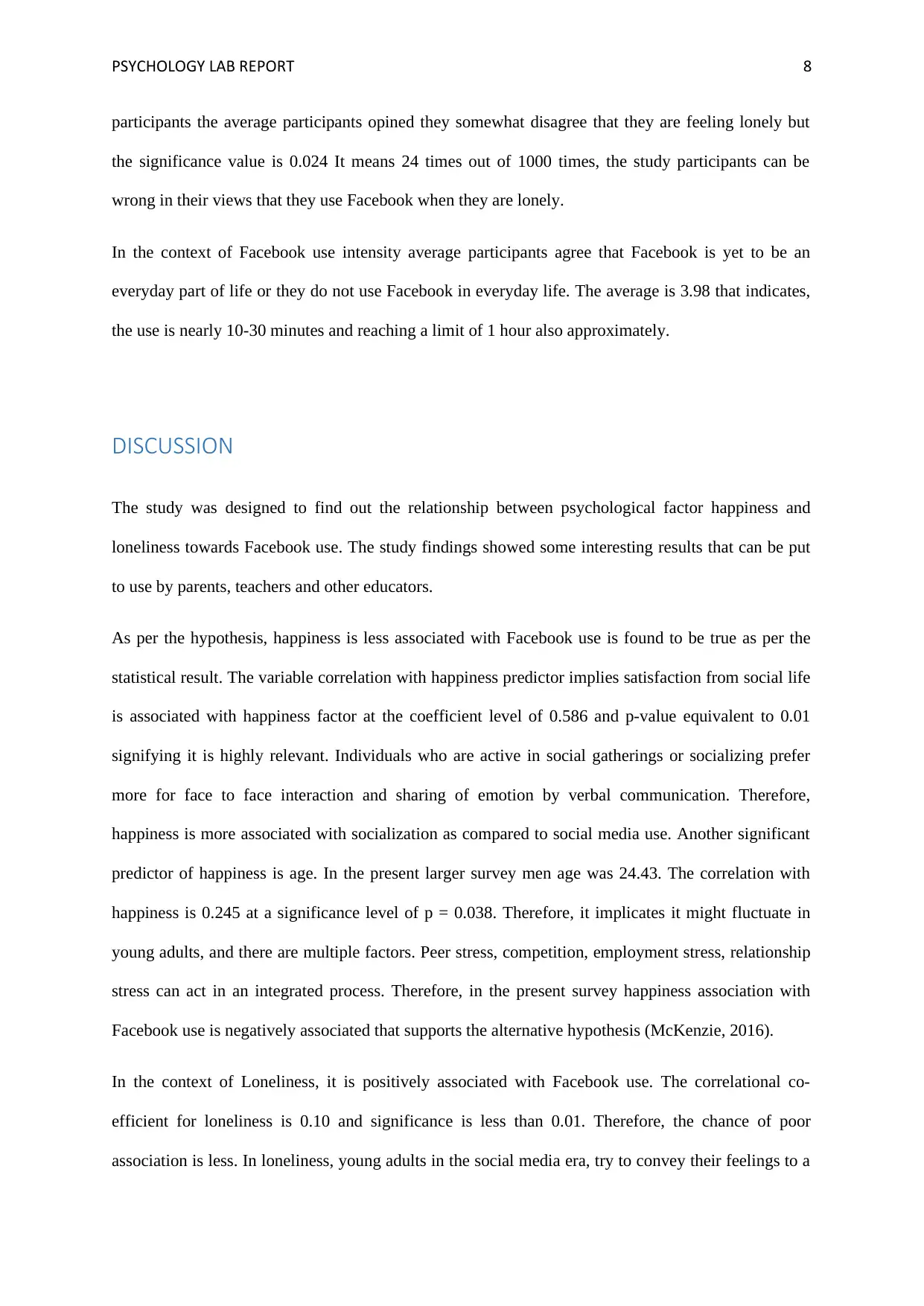
PSYCHOLOGY LAB REPORT 8
participants the average participants opined they somewhat disagree that they are feeling lonely but
the significance value is 0.024 It means 24 times out of 1000 times, the study participants can be
wrong in their views that they use Facebook when they are lonely.
In the context of Facebook use intensity average participants agree that Facebook is yet to be an
everyday part of life or they do not use Facebook in everyday life. The average is 3.98 that indicates,
the use is nearly 10-30 minutes and reaching a limit of 1 hour also approximately.
DISCUSSION
The study was designed to find out the relationship between psychological factor happiness and
loneliness towards Facebook use. The study findings showed some interesting results that can be put
to use by parents, teachers and other educators.
As per the hypothesis, happiness is less associated with Facebook use is found to be true as per the
statistical result. The variable correlation with happiness predictor implies satisfaction from social life
is associated with happiness factor at the coefficient level of 0.586 and p-value equivalent to 0.01
signifying it is highly relevant. Individuals who are active in social gatherings or socializing prefer
more for face to face interaction and sharing of emotion by verbal communication. Therefore,
happiness is more associated with socialization as compared to social media use. Another significant
predictor of happiness is age. In the present larger survey men age was 24.43. The correlation with
happiness is 0.245 at a significance level of p = 0.038. Therefore, it implicates it might fluctuate in
young adults, and there are multiple factors. Peer stress, competition, employment stress, relationship
stress can act in an integrated process. Therefore, in the present survey happiness association with
Facebook use is negatively associated that supports the alternative hypothesis (McKenzie, 2016).
In the context of Loneliness, it is positively associated with Facebook use. The correlational co-
efficient for loneliness is 0.10 and significance is less than 0.01. Therefore, the chance of poor
association is less. In loneliness, young adults in the social media era, try to convey their feelings to a
participants the average participants opined they somewhat disagree that they are feeling lonely but
the significance value is 0.024 It means 24 times out of 1000 times, the study participants can be
wrong in their views that they use Facebook when they are lonely.
In the context of Facebook use intensity average participants agree that Facebook is yet to be an
everyday part of life or they do not use Facebook in everyday life. The average is 3.98 that indicates,
the use is nearly 10-30 minutes and reaching a limit of 1 hour also approximately.
DISCUSSION
The study was designed to find out the relationship between psychological factor happiness and
loneliness towards Facebook use. The study findings showed some interesting results that can be put
to use by parents, teachers and other educators.
As per the hypothesis, happiness is less associated with Facebook use is found to be true as per the
statistical result. The variable correlation with happiness predictor implies satisfaction from social life
is associated with happiness factor at the coefficient level of 0.586 and p-value equivalent to 0.01
signifying it is highly relevant. Individuals who are active in social gatherings or socializing prefer
more for face to face interaction and sharing of emotion by verbal communication. Therefore,
happiness is more associated with socialization as compared to social media use. Another significant
predictor of happiness is age. In the present larger survey men age was 24.43. The correlation with
happiness is 0.245 at a significance level of p = 0.038. Therefore, it implicates it might fluctuate in
young adults, and there are multiple factors. Peer stress, competition, employment stress, relationship
stress can act in an integrated process. Therefore, in the present survey happiness association with
Facebook use is negatively associated that supports the alternative hypothesis (McKenzie, 2016).
In the context of Loneliness, it is positively associated with Facebook use. The correlational co-
efficient for loneliness is 0.10 and significance is less than 0.01. Therefore, the chance of poor
association is less. In loneliness, young adults in the social media era, try to convey their feelings to a
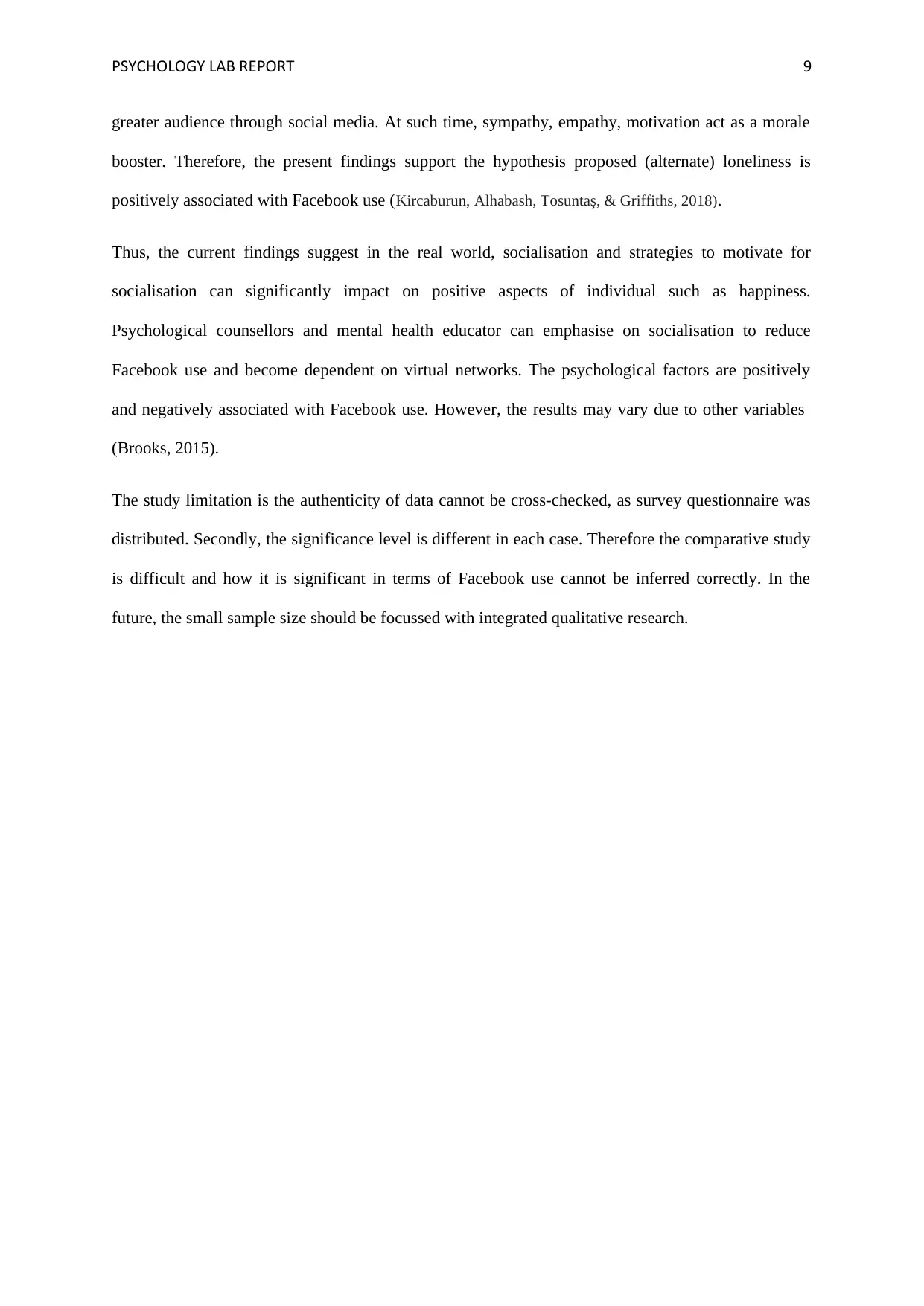
PSYCHOLOGY LAB REPORT 9
greater audience through social media. At such time, sympathy, empathy, motivation act as a morale
booster. Therefore, the present findings support the hypothesis proposed (alternate) loneliness is
positively associated with Facebook use (Kircaburun, Alhabash, Tosuntaş, & Griffiths, 2018).
Thus, the current findings suggest in the real world, socialisation and strategies to motivate for
socialisation can significantly impact on positive aspects of individual such as happiness.
Psychological counsellors and mental health educator can emphasise on socialisation to reduce
Facebook use and become dependent on virtual networks. The psychological factors are positively
and negatively associated with Facebook use. However, the results may vary due to other variables
(Brooks, 2015).
The study limitation is the authenticity of data cannot be cross-checked, as survey questionnaire was
distributed. Secondly, the significance level is different in each case. Therefore the comparative study
is difficult and how it is significant in terms of Facebook use cannot be inferred correctly. In the
future, the small sample size should be focussed with integrated qualitative research.
greater audience through social media. At such time, sympathy, empathy, motivation act as a morale
booster. Therefore, the present findings support the hypothesis proposed (alternate) loneliness is
positively associated with Facebook use (Kircaburun, Alhabash, Tosuntaş, & Griffiths, 2018).
Thus, the current findings suggest in the real world, socialisation and strategies to motivate for
socialisation can significantly impact on positive aspects of individual such as happiness.
Psychological counsellors and mental health educator can emphasise on socialisation to reduce
Facebook use and become dependent on virtual networks. The psychological factors are positively
and negatively associated with Facebook use. However, the results may vary due to other variables
(Brooks, 2015).
The study limitation is the authenticity of data cannot be cross-checked, as survey questionnaire was
distributed. Secondly, the significance level is different in each case. Therefore the comparative study
is difficult and how it is significant in terms of Facebook use cannot be inferred correctly. In the
future, the small sample size should be focussed with integrated qualitative research.
⊘ This is a preview!⊘
Do you want full access?
Subscribe today to unlock all pages.

Trusted by 1+ million students worldwide
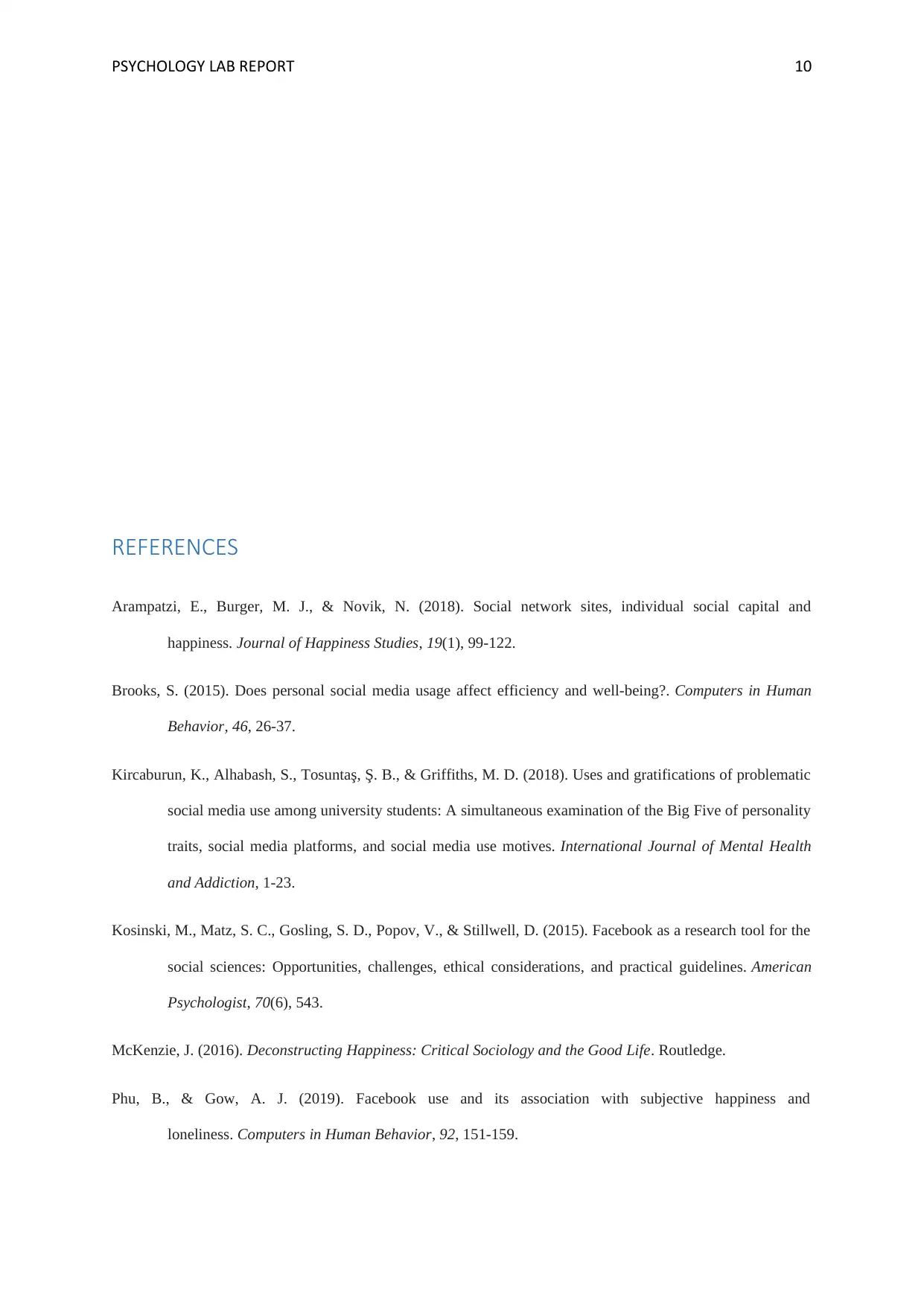
PSYCHOLOGY LAB REPORT 10
REFERENCES
Arampatzi, E., Burger, M. J., & Novik, N. (2018). Social network sites, individual social capital and
happiness. Journal of Happiness Studies, 19(1), 99-122.
Brooks, S. (2015). Does personal social media usage affect efficiency and well-being?. Computers in Human
Behavior, 46, 26-37.
Kircaburun, K., Alhabash, S., Tosuntaş, Ş. B., & Griffiths, M. D. (2018). Uses and gratifications of problematic
social media use among university students: A simultaneous examination of the Big Five of personality
traits, social media platforms, and social media use motives. International Journal of Mental Health
and Addiction, 1-23.
Kosinski, M., Matz, S. C., Gosling, S. D., Popov, V., & Stillwell, D. (2015). Facebook as a research tool for the
social sciences: Opportunities, challenges, ethical considerations, and practical guidelines. American
Psychologist, 70(6), 543.
McKenzie, J. (2016). Deconstructing Happiness: Critical Sociology and the Good Life. Routledge.
Phu, B., & Gow, A. J. (2019). Facebook use and its association with subjective happiness and
loneliness. Computers in Human Behavior, 92, 151-159.
REFERENCES
Arampatzi, E., Burger, M. J., & Novik, N. (2018). Social network sites, individual social capital and
happiness. Journal of Happiness Studies, 19(1), 99-122.
Brooks, S. (2015). Does personal social media usage affect efficiency and well-being?. Computers in Human
Behavior, 46, 26-37.
Kircaburun, K., Alhabash, S., Tosuntaş, Ş. B., & Griffiths, M. D. (2018). Uses and gratifications of problematic
social media use among university students: A simultaneous examination of the Big Five of personality
traits, social media platforms, and social media use motives. International Journal of Mental Health
and Addiction, 1-23.
Kosinski, M., Matz, S. C., Gosling, S. D., Popov, V., & Stillwell, D. (2015). Facebook as a research tool for the
social sciences: Opportunities, challenges, ethical considerations, and practical guidelines. American
Psychologist, 70(6), 543.
McKenzie, J. (2016). Deconstructing Happiness: Critical Sociology and the Good Life. Routledge.
Phu, B., & Gow, A. J. (2019). Facebook use and its association with subjective happiness and
loneliness. Computers in Human Behavior, 92, 151-159.
Paraphrase This Document
Need a fresh take? Get an instant paraphrase of this document with our AI Paraphraser
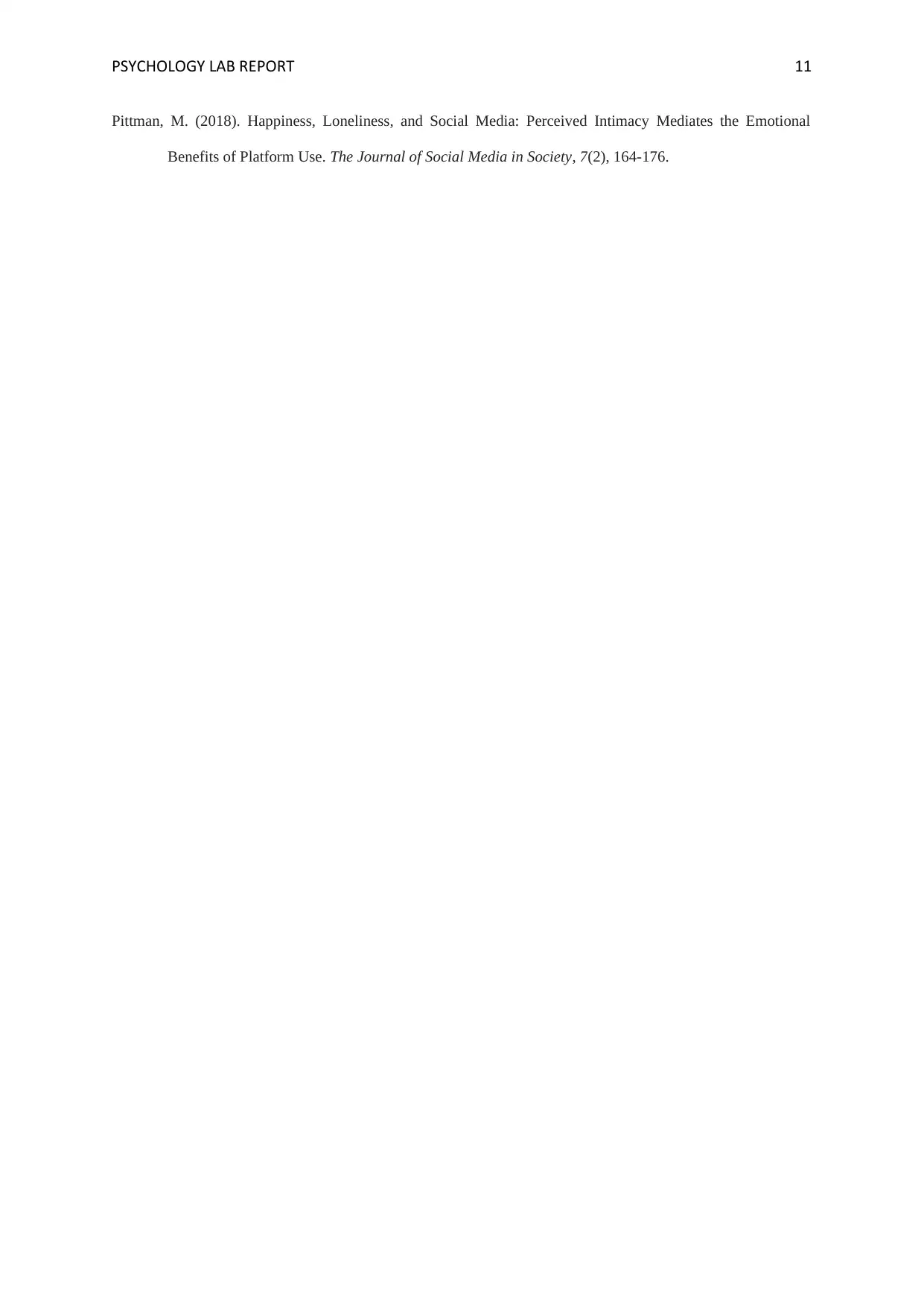
PSYCHOLOGY LAB REPORT 11
Pittman, M. (2018). Happiness, Loneliness, and Social Media: Perceived Intimacy Mediates the Emotional
Benefits of Platform Use. The Journal of Social Media in Society, 7(2), 164-176.
Pittman, M. (2018). Happiness, Loneliness, and Social Media: Perceived Intimacy Mediates the Emotional
Benefits of Platform Use. The Journal of Social Media in Society, 7(2), 164-176.
1 out of 11
Related Documents
Your All-in-One AI-Powered Toolkit for Academic Success.
+13062052269
info@desklib.com
Available 24*7 on WhatsApp / Email
![[object Object]](/_next/static/media/star-bottom.7253800d.svg)
Unlock your academic potential
Copyright © 2020–2026 A2Z Services. All Rights Reserved. Developed and managed by ZUCOL.




